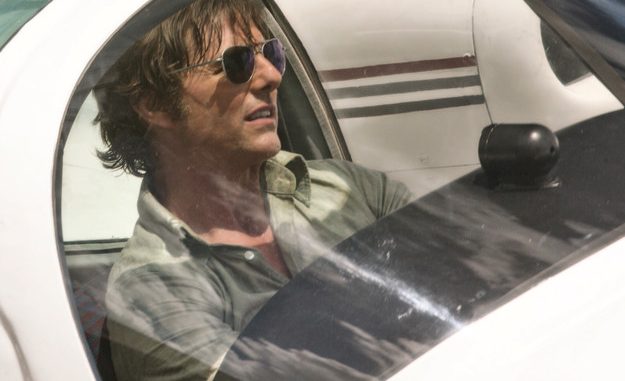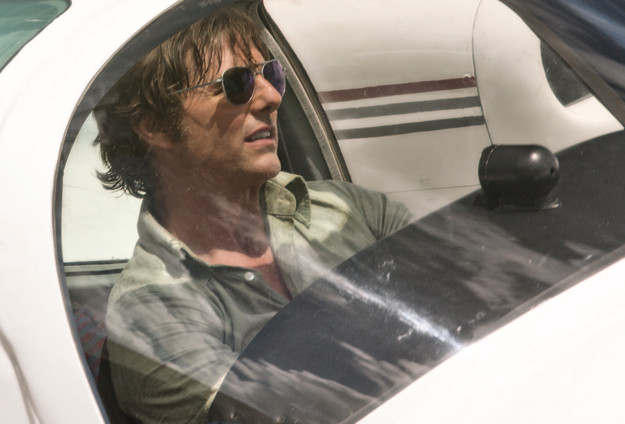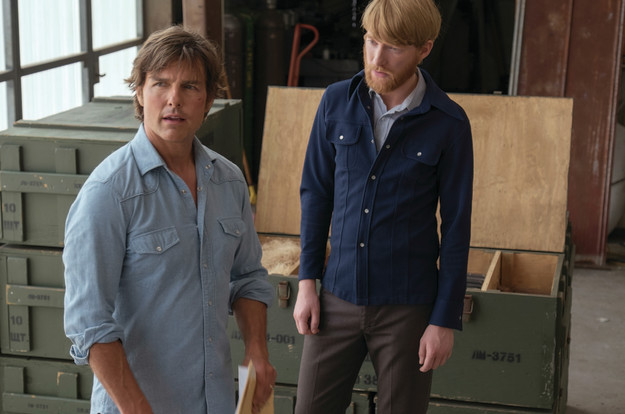

Tom Cruise in American Made.
David James / Universal Pictures
In his new movie, Tom Cruise plays a hotshot pilot with a need for speed, a megawatt smile, and penchant for breaking the rules. Yup, just like he did in Top Gun, only this time around, he’s not an all-American hero: He’s an all-American fool. He’s Barry Seal, a fictionalized riff on the real man of the same name who ran drugs for Pablo Escobar, served as a DEA informant, and — at least in the film — did it all under the questionable protection of the CIA, who recruited him to run surveillance missions and, later, guns to the Contras.
Three decades after Maverick in Top Gun smirkingly fought baddies from an enemy nation the movie never bothered to name, Barry in American Made carelessly smuggles coke and weapons, and gets so rich off the venture that he runs out of space in his house to store all the dough he’s yet to launder. “If this ain’t the greatest country in the world…” he muses, never giving more thought to the massive Cold War schemes he’s become a part of, or the consequences of what he’s doing.
American Made, which was directed by Doug Liman and written by Gary Spinelli, isn’t the greatest of Tom Cruise roles, but it is the most resoundingly self-referential. What’s otherwise a diverting but dismissible romp through some of the darker elements of the ’80s (including Iran-Contra, which Reagan nostalgists prefer to gloss over, revise, or flat-out ignore) becomes sometimes more with Cruise at the center, letting out familiar whoops of glee as his plane just barely clears a short Columbian runway. It becomes a referendum on the type of character that made him a movie star in the first place, in the Risky Business/Top Gun/Cocktail/Days of Thunder era — the underdog whose let’s-just-do-it-and-be-legends cocksureness is synonymous with his appeal.

Cruise and Domhnall Gleeson.
David James / Universal Pictures
Like a lot of the protagonists Cruise spent the better part of the ’80s playing, Barry is an American dreamer, a guy with a particular talent and an easy certainty that he deserves the good things that come his way. But these qualities are more amusing than charming on Barry, who takes up the CIA’s dangerous proposition like it’s the opportunity he’s been waiting for all his life. Barry isn’t portrayed as morally compromised so much as morally oblivious, treating every offer that comes his way as a new adventure, accepting the description of “crazy” as a compliment. He’s a man who thinks he’s the hero of the story, when in fact he’s the punchline.
It’s unclear how aware Cruise is of the way American Made plays off his own onscreen image, because the role depends on the actor playing it straight, with not a wink of self-awareness even when Barry crash-lands a plane in a suburban street, emerges covered in cocaine, and makes his escape by pedaling away frantically on a child’s bike. Barry’s lack of self-awareness is his foremost quality, really. At the start of the film, he’s a commercial pilot stultified by his TWA gig, to the point where we see him creating “turbulence” on a flight just for kicks.
When a CIA agent named Schafer (Domhnall Gleeson, playing his character as a frustrated cubicle drone just trying to get ahead) approaches Barry at a hotel bar one day, talking about “building nations down there,” it doesn’t take much to get him on board. A fast plane, a shell company, and a mission to take photos of rebel groups in Central America is enough to lure the pilot into dumping his stifling but stable job. He has no problem keeping this secret from his wife, Lucy (Sarah Wright), until bad timing sends them scurrying from their home in the middle of the night and off to a CIA-provided stretch of land in Arkansas that becomes the base of a larger off-the-books operation.

Tom Cruise and Sarah Wright in American Made.
David James / Universal Pictures
“I do have a tendency to leap before I look,” Barry confesses to a camcorder in one of the self-made videos the movie is punctuated with, a stylistic choice that’s more irritating than illuminating. Barry does a whole lot of impulsive leaping, from surveillance to drug smuggling to gun running to flying Contras back to the US for training, at which point most of them run away. He’s a fitting point person for an operation that no one on the government side seems ready to admit is a disaster — someone for whom self-interest and serving his country are one and the same. American Made doesn’t surprise with its arc of rise and fall, the apex being the glorious scene in which Barry and Lucy have temporarily weightless sex while flying a plane full of goods back from Columbia, giddy with illicit success. The inevitable comedown is hard, of course, but not that hard, because you’re never really invested in Barry, with his piles of cash overflowing from every cabinet and his blithe, unthinking participation in large-scale trafficking.
It’s Cruise who sticks in your mind, especially in scenes like the ones in which Barry shows off in the air, dodging rebel army fire or taunting the DEA agents trying to track him down. There’s one sequence in which he wakes up a fellow pilot who’s fallen asleep at the wheel by jostling the wings of their planes together, and it really is like a dirtbag version of the opening sequence of Top Gun. It’s as if Maverick grew up, settled down, got bored, and then went back to chasing the same hotdogging highs he used to in a queasier setting, his avowed patriotism exposed as an empty excuse. When Cruise, as Barry, laughs as he and his boys evade capture on the way back into the US with cargo holds full of coke, it’s with the same confident sparkle he’s always projected. But there’s no blockbuster cool to it — what you end up thinking is, God, what a dick.

